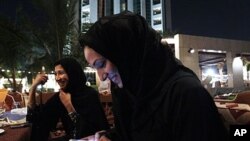Saudi women are hailing King Abdullah's promise of expanded political rights, with the hope it is another step toward equality in the ultraconservative kingdom.
The king's announcement that women may run for office and cast votes in the next round of municipal elections, set for 2015, is the latest in a string of reforms -- modest compared to most countries but domestically radical and long opposed by members of the Saudi elite.
The monarch's promises also include their appointment to the largely ceremonial Shura council, an advisory body. Women will not be allowed to take part in municipal elections this Thursday, however, and some Saudi women are continuing to push for other basic freedoms such as the right to drive a car or leave the country without a male relative's permission.
Samar Fatany, a columnist at the Arab News, a daily newspaper in Jeddah, is among those who welcome the upcoming enfranchisement.
"It is a very, very positive step," she said. "It gives us hope [and] really encourages us to work harder for women to assert themselves and to be part of the decision-making process."
Timing of the reforms questioned
The initiative comes as leaders across the Arab world struggle to meet the demands of their people, or risk going the way of the ex-leaders of Tunisia, Egypt and Libya. Already this year, King Abdullah announced a $130 billion program to boost salaries, build housing and fund other popular measures.
But Basmah Omair, director of the al Sayeda Khadija bin Khawlid Center at the Jeddah Chamber of Commerce, says it would be a mistake to think the latest move is a result of only the Arab Spring.
"In recent years, you have seen women take leadership positions like the deputy of the ministry of education and vice mayor of Jeddah," he said. "So it's not something [new], but maybe the media is concentrating [on these events] now and that is why they are just thinking of the recent events of 2011."
Fatany attributes recent gains both to the king, seen as a reformer since taking the throne in 2005, and the women who have seized opportunities and served as role models.
The biggest challenge to furthering women's rights, she said, is generalized fear of societal change reinforced by the nation's puritanical clergy.
"Saudi society has been isolated from the rest of the world and, as a result, the majority of the people are reluctant to change," she said. "They are wary of change, thinking that this would erode their values and their customs. The culture of fear of the unknown, fear of being too Westernized or that our values would be compromised, has been indoctrinated in people's minds by hardliners and extremists."
Driving laws challenged
Opposition to change has recently been challenged with some women protesting the ban on their driving. Since June, women across Saudi Arabia have been getting behind the wheel, resulting in numerous arrests and splitting opinion on what the next step should be.
Omair, for example, said that while driving is an issue, it should not be overshadowed by more pressing priorities.
"The fact of women driving is going to take just a few more years probably, to get infrastructure ready, to prepare the women, to open the training centers for women driving," he said. "But I am more optimistic and looking forward to the public transportation."
But even with good public transit, many Saudi women would still find themselves without jobs to go to.
Although females now make up the majority of university students, they represent less than 15% of the workforce -- one of the lowest levels in the world. Strict gender segregation based on interpretations of Islamic law keep many of them out of the workplace, even basic retail services where they might encounter men.
Women must also be accompanied by male relatives in many situations, further hampering freedom of movement.
But Fatany points to recent trends in education that, if nurtured, could bring about more substantial reform.
"The national dialogue that has started, debating issues that were tabooed in the past; scholarship programs that send so many of our students abroad to be also exposed to other cultures," she said. "As a result, the educated elite, the intellectuals or the minority of progressive thinkers have a great role to play in order to influence change and allow our young people to be the engines for a better future."
How fast that change will come and in what form remains unclear. Whether or not Saudi women drive themselves to the polls to cast votes in 2015 might provide an indication.
Saudi Women Welcome Suffrage, Keep Eye on Driver's Seat




